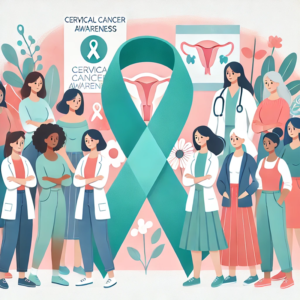January is Cervical Cancer Awareness Month
 Cervical cancer is one of the most preventable types of cancer, yet it affects thousands of women each year. In the United States, about 13,960 new cases of invasive cervical cancer were diagnosed in 2023, and approximately 4,310 women lost their lives to the disease (American Cancer Society, 2023). Early detection through regular screening and prevention with the HPV vaccine are key to reducing these numbers.
Cervical cancer is one of the most preventable types of cancer, yet it affects thousands of women each year. In the United States, about 13,960 new cases of invasive cervical cancer were diagnosed in 2023, and approximately 4,310 women lost their lives to the disease (American Cancer Society, 2023). Early detection through regular screening and prevention with the HPV vaccine are key to reducing these numbers.
How You Can Stay Protected
- Get Screened Regularly: Pap tests (or Pap smears) and HPV tests can detect abnormal cells early, when treatment is most effective. The U.S. Preventive Services Task Force recommends regular screenings starting at age 21.
- Get Vaccinated: The HPV vaccine protects against the virus that causes most cervical cancer cases. It’s recommended for children and adults up to age 26 and can still benefit some individuals up to age 45.
- Know the Risk Factors: Smoking, a weakened immune system, and inconsistent screening increase your risk for cervical cancer. Talk to your healthcare provider about ways to lower your risk.
PHC is Here to Help
Primary Health Care offers cervical cancer screenings, HPV vaccinations, and comprehensive women’s health services at our clinics in Ames, Des Moines, and Marshalltown. We accept Medicaid, private insurance, and offer a sliding fee scale to ensure access to care for all.
Take charge of your health this January by scheduling a screening or discussing the HPV vaccine with your provider. Together, we can work to prevent cervical cancer and protect the health of our community.
Sources:
- American Cancer Society. (2023). Key Statistics for Cervical Cancer. Retrieved from https://www.cancer.org.
- Centers for Disease Control and Prevention (CDC). (2022). Cervical Cancer Awareness. Retrieved from https://www.cdc.gov.
Related Posts
Making It OK: Let’s Talk About Mental Health
May is Mental Health Awareness Month—a time when communities come together to remind everyone that discussing mental health is not only acceptable, it’s essential. At Primary Health Care, we believe that every conversation matters. When we share our feelings,...
Breaking the Stigma: Students Speak Out on Mental Health
PHC's Student Advisory Council took over Polk County Health Department's By The Numbers podcast to talk about teens and mental health. Watch both Part 1 and Part 2 here!By the Numbers- Health Ya! Part 1: Youth Mental Health with the PHC Student Advisory CouncilBy the...
Feeling Overwhelmed? Discover 5 Simple Stress-Busting Techniques You Can Start Today
April is Stress Awareness Month, a time to recognize the impact stress has on our lives and learn effective ways to manage it. Stress affects everyone differently—what's stressful for one person might not be for another. Both joyful events, like a new job or moving...
STOP Eating These Foods If You’re Stressed!
Cortisol is a hormone our bodies make when we're stressed. It helps us handle tough situations, but too much for too long can harm our health. Some foods can raise cortisol levels, making stress harder to manage. Let’s learn about these foods and how to make healthier...
Colon Cancer Can Be Silent—But This Simple Test Could Save Your Life!
Colorectal cancer is a type of cancer that starts in the colon or rectum. It's one of the most common cancers in the United States, but it's also one of the most preventable. Regular screening can find this cancer early, when treatment works best. Who Should Get...
Celebrating National School-Based Health Care Awareness Month
February is National School-Based Health Care Awareness Month, a time to recognize the vital role that school-based health centers (SBHCs) play in supporting student health and academic success. By providing accessible, on-site medical and behavioral health services,...






